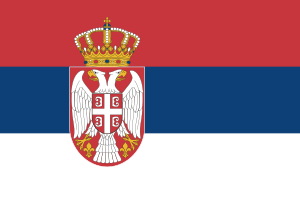What does Serbia mean?
Definitions for Serbia
ˈsɜr bi əser·bia
This dictionary definitions page includes all the possible meanings, example usage and translations of the word Serbia.
Princeton's WordNet
Serbia, Srbijanoun
a historical region in central and northern Yugoslavia; Serbs settled the region in the 6th and 7th centuries
Wiktionary
Serbianoun
A country in southeastern Europe
Serbianoun
A region in southeastern Europe
Wikipedia
Serbia
Serbia ( (listen), SUR-bee-ə; Serbian: Србија, Srbija, pronounced [sř̩bija] (listen)), officially the Republic of Serbia (Serbian: Република Србија, Republika Srbija, pronounced [repǔblika sř̩bija] (listen)), is a landlocked country in Southeastern and Central Europe, situated at the crossroads of the Pannonian Basin and the Balkans. It shares land borders with Hungary to the north, Romania to the northeast, Bulgaria to the southeast, North Macedonia to the south, Croatia and Bosnia and Herzegovina to the west, and Montenegro to the southwest, and claims a border with Albania through the disputed territory of Kosovo. Serbia without Kosovo has about 6.7 million inhabitants, about 8.4 million if Kosovo is included. Its capital Belgrade is also the largest city. Continuously inhabited since the Paleolithic Age, the territory of modern-day Serbia faced Slavic migrations in the 6th century, establishing several regional states in the early Middle Ages at times recognised as tributaries to the Byzantine, Frankish and Hungarian kingdoms. The Serbian Kingdom obtained recognition by the Holy See and Constantinople in 1217, reaching its territorial apex in 1346 as the Serbian Empire. By the mid-16th century, the Ottomans annexed the entirety of modern-day Serbia; their rule was at times interrupted by the Habsburg Empire, which began expanding towards Central Serbia from the end of the 17th century while maintaining a foothold in Vojvodina. In the early 19th century, the Serbian Revolution established the nation-state as the region's first constitutional monarchy, which subsequently expanded its territory. Following casualties in World War I, and the subsequent unification of the former Habsburg crownland of Vojvodina with Serbia, the country co-founded Yugoslavia with other South Slavic nations, which would exist in various political formations until the Yugoslav Wars of the 1990s. During the breakup of Yugoslavia, Serbia formed a union with Montenegro, which was peacefully dissolved in 2006, restoring Serbia's independence as a sovereign state for the first time since 1918. In 2008, representatives of the Assembly of Kosovo unilaterally declared independence, with mixed responses from the international community while Serbia continues to claim it as part of its own sovereign territory. Serbia is an upper-middle income economy, ranked "very high" in the Human Development Index domain (63rd position). It is a unitary parliamentary constitutional republic, member of the UN, CoE, OSCE, PfP, BSEC, CEFTA, and is acceding to the WTO. Since 2014, the country has been negotiating its EU accession, with the aim of joining the European Union by 2025. Serbia formally adheres to the policy of military neutrality. The country provides universal health care and free primary and secondary education to its citizens.
ChatGPT
serbia
Serbia is a landlocked country located in Southeast Europe in the central Balkan Peninsula. It is officially known as the Republic of Serbia. The capital city and its largest city is Belgrade. The Serbian state traces its origins to the 7th century, but it gained its independence in the 19th century. Its economy is primarily based on industry and agriculture and the nation's culture has a rich historical background in literature, arts, music, and sports. It is a multi-ethnic and multi-cultural society, with Serbs as the majority inhabitants. The official language is Serbian, and the prevalent religion is Eastern Orthodox Christianity.
Wikidata
Serbia
Serbia, officially the Republic of Serbia, is a country located at the crossroads of Central and Southeast Europe, covering the southern part of the Pannonian Plain and the central Balkans. A landlocked country, Serbia borders Hungary to the north; Romania and Bulgaria to the east; Macedonia to the south; and Croatia, Bosnia, and Montenegro to the west; also, it borders Albania through the disputed territory of Kosovo. The capital of Serbia, Belgrade, is among Europe's oldest cities, and one of the largest in East Central Europe. Following their settlement in the Balkans, Serbs established several states in the early Middle Ages. The Serbian Kingdom obtained recognition by Rome and Constantinople in 1217; the state was elevated to the Serbian Empire, in 1346. By the mid-16th century, the entire territory of modern-day Serbia was annexed by the Ottoman Empire, at times interrupted by the Habsburgs. In the early 19th century the Serbian revolution established the nation-state as the region's first constitutional monarchy, which subsequently expanded its territory and pioneered the abolition of feudalism in the Balkans. Following disastrous casualties in World War I, and subsequent unification of Habsburg crownland of Vojvodina and Syrmia with Serbia, the country co-founded Yugoslavia with other South Slavic peoples, which would exist in various formations until 2006. In February 2008 the parliament of UNMIK-administered Kosovo declared independence, with mixed responses from international governments.
U.S. National Library of Medicine
Serbia
A republic located south of HUNGARY, west of ROMANIA and BULGARIA, and part of the former YUGOSLAVIA. The capital is Belgrade.
Surnames Frequency by Census Records
SERBIA
According to the U.S. Census Bureau, Serbia is ranked #151532 in terms of the most common surnames in America.
The Serbia surname appeared 108 times in the 2010 census and if you were to sample 100,000 people in the United States, approximately 0 would have the surname Serbia.
77.7% or 84 total occurrences were of Hispanic origin.
18.5% or 20 total occurrences were White.
Usage in printed sourcesFrom:
- [["1915","1"],["1916","3"],["1918","4"],["1919","5"],["1920","5"],["1922","1"],["1923","2"],["1924","2"],["1929","1"],["1930","3"],["1932","3"],["1940","1"],["1942","2"],["1946","1"],["1950","1"],["1951","2"],["1953","1"],["1958","1"],["1965","1"],["1967","1"],["1969","2"],["1971","1"],["1972","2"],["1973","1"],["1976","1"],["1980","1"],["1981","21"],["1982","2"],["1983","22"],["1984","2"],["1985","1"],["1986","1"],["1988","1"],["1989","7"],["1990","3"],["1991","22"],["1992","4"],["1993","6"],["1994","2"],["1995","2"],["1996","28"],["1997","7"],["1998","15"],["1999","9"],["2000","15"],["2001","5"],["2002","21"],["2003","11"],["2004","9"],["2005","14"],["2006","19"],["2007","70"],["2008","126"]]
Anagrams for Serbia »
braies
braise
rabies
Numerology
Chaldean Numerology
The numerical value of Serbia in Chaldean Numerology is: 5
Pythagorean Numerology
The numerical value of Serbia in Pythagorean Numerology is: 9
Examples of Serbia in a Sentence
Interior Minister Ranko Ostojic:
It is absolutely unacceptable to have Greece emptying its refugee camps and sending people towards Croatia via Macedonia and Serbia.
Serbian President Tomsilav Nikolic:
After so many years the Chinese president is visiting Serbia. That is like spring after a long winter.
Why do you, from Wagner, call anyone from Serbia when you know that it is against our regulations ?
There are other suspects in Serbia and neighboring countries and we are after them as well.
Citizens of Serbia, all your prime minister needs to do is to stop such an intense flow of migrants, we can function with 4,000 to 5,000 people a day. But more than that will not work, and I will not allow it.
Popularity rank by frequency of use
References
Translations for Serbia
From our Multilingual Translation Dictionary
Get even more translations for Serbia »
Translation
Find a translation for the Serbia definition in other languages:
Select another language:
- - Select -
- 简体中文 (Chinese - Simplified)
- 繁體中文 (Chinese - Traditional)
- Español (Spanish)
- Esperanto (Esperanto)
- 日本語 (Japanese)
- Português (Portuguese)
- Deutsch (German)
- العربية (Arabic)
- Français (French)
- Русский (Russian)
- ಕನ್ನಡ (Kannada)
- 한국어 (Korean)
- עברית (Hebrew)
- Gaeilge (Irish)
- Українська (Ukrainian)
- اردو (Urdu)
- Magyar (Hungarian)
- मानक हिन्दी (Hindi)
- Indonesia (Indonesian)
- Italiano (Italian)
- தமிழ் (Tamil)
- Türkçe (Turkish)
- తెలుగు (Telugu)
- ภาษาไทย (Thai)
- Tiếng Việt (Vietnamese)
- Čeština (Czech)
- Polski (Polish)
- Bahasa Indonesia (Indonesian)
- Românește (Romanian)
- Nederlands (Dutch)
- Ελληνικά (Greek)
- Latinum (Latin)
- Svenska (Swedish)
- Dansk (Danish)
- Suomi (Finnish)
- فارسی (Persian)
- ייִדיש (Yiddish)
- հայերեն (Armenian)
- Norsk (Norwegian)
- English (English)
Word of the Day
Would you like us to send you a FREE new word definition delivered to your inbox daily?
Citation
Use the citation below to add this definition to your bibliography:
Style:MLAChicagoAPA
"Serbia." Definitions.net. STANDS4 LLC, 2025. Web. 21 Jan. 2025. <https://www.definitions.net/definition/Serbia>.




Discuss these Serbia definitions with the community:
Report Comment
We're doing our best to make sure our content is useful, accurate and safe.
If by any chance you spot an inappropriate comment while navigating through our website please use this form to let us know, and we'll take care of it shortly.
Attachment
You need to be logged in to favorite.
Log In